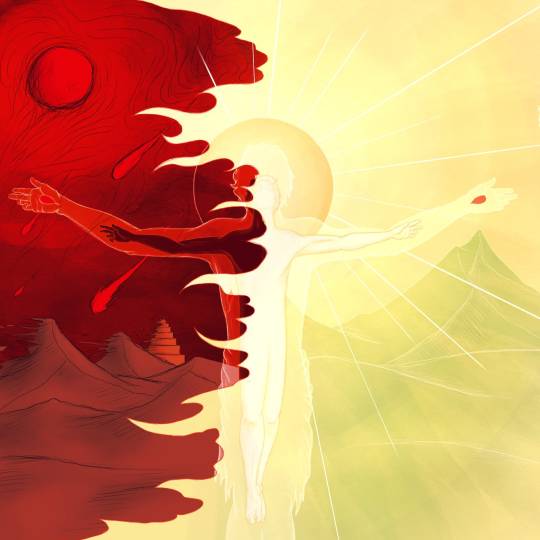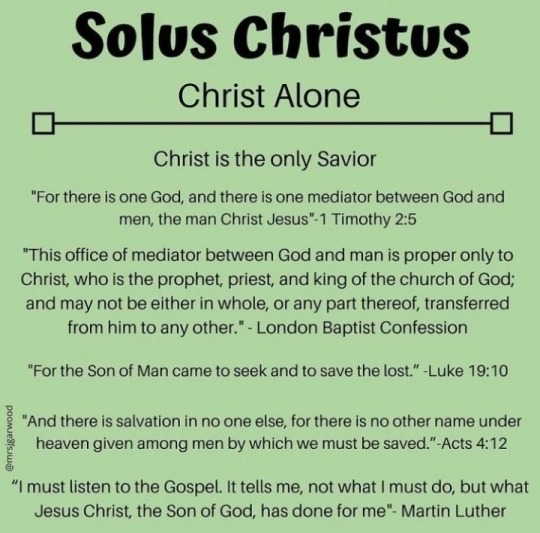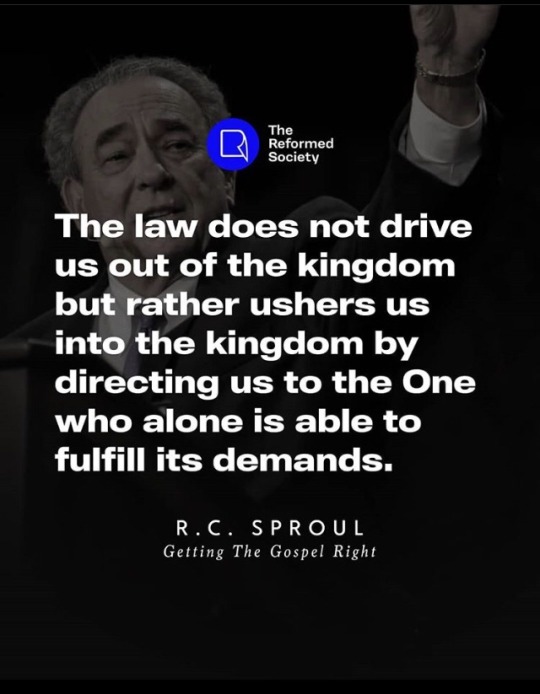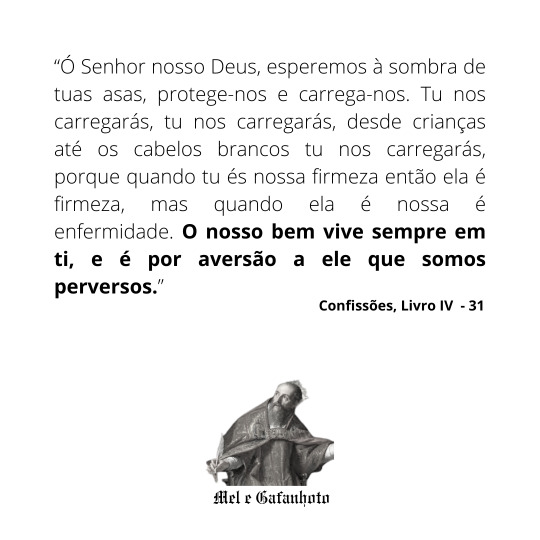#Sola Fide
Text
I don't often post much on theological topics these days, because I'm tired from the online arguing and no one really listening. But let me break my own silence. I sometimes see posts about people questioning their salvation or wanting assurance for their salvation, and I just want to say if you believe in the promises of God, that you will never be taken out of The Father's hand, that you love Jesus and want to live a life that is pleasing to Him while doing it imperfectly but empowered by The Holy Spirit, then be assured that you are God's treasured possession. If your trust is in Christ, then you are a golden vessel laid up in the temple of God, for God's own glory. Rest assured that you're only hope in life and in death is that you are not your own, but belong body and soul to your faithful savior Jesus Christ, and not a hair can fall from your head without the will of your Father in Heaven. Come, buy bread and milk without money.
308 notes
·
View notes
Text
“…and are justified by his grace as a gift, through the redemption that is in Christ Jesus, whom God put forward as a propitiation by his blood, to be received by faith. This was to show God’s righteousness, because in his divine forbearance he had passed over former sins. It was to show his righteousness at the present time, so that he might be just and the justifier of the one who has faith in Jesus.
Then what becomes of our boasting? It is excluded. By what kind of law? By a law of works? No, but by the law of faith.”
Romans 3:24-27 ESV
16 notes
·
View notes
Text
We have seen that for Paul, to be in Christ is to live a life of cruciformity, to be shaped by his presence and his story, not only from without but also from within, because it is true that "Christ lives in me." As noted briefly earlier, the intimacy of this Pauline experience often finds expression in phrases and words that are translated into English using the word "with." […] English expressions containing the word "with" simply do not do justice to much of Paul's language, experience, or thinking in this regard. The prefix "co-" does a better job; Paul says that we have to be co-buried and co-crucified with Christ, that we have to been co-formed with his death and will be co-formed with his resurrection in glory, that if we co-suffer with Christ we are coheirs with him and will be co-glorified with him.
The focus of this participation is on suffering and death with Christ in the present, and on resurrection and glory in the future. […] The language of Romans 6:5, though it focuses on the future resurrection, suggests, by using the perfect tense ("we have been united with him in a death like this"), that union with Christ's death is not a one-time past event but an ongoing reality.
- Michael Gorman (Cruciformity: Paul's Narrative Spirituality of the Cross, pages 45, 46)
Michael Gorman cites Albert Schweitzer's contention that "in-Christ" mysticism, not justification by faith, was the center of Paul's theology and experience. [...] Being united with Christ in this way answers those who may think that salvation through [...] praxis is "Pelagian." It is not our actions that save us; it is our being united with Christ in his way of the cross that saves us. This way of the cross continues across time through his Body, the church.
- Terrence Rynne (Gandhi & Jesus: The Saving Power of Nonviolence, page 181)
The means by which the new society [of Christ] spread was [...] discipleship: a non-envious identification with this person.
- Norbert Lohfink (Church Dreams: Talking Against the Trend, page 97), trans. Linda Maloney

Crucified to the World, by Chris Powers
#Christianity#Catholicism#Jesus Christ#Crucifixion#kenosis#Resurrection#grace#Saint Paul#Imitatio Dei#Pelagianism#mysticism#Co Redemptrix#sola fide#Epistle to the Romans#Via Crucis#Letter to the Galatians#salvation#Ecclesia
4 notes
·
View notes
Note
Hi
https://youtube.com/@solafidedeum
Or search on YT
Sola fide deum
What's is your thoughts on this Christan YouTube channel?
Would you subscribe and recommend this channel to your family and friends?
Your review is important to us.
Happy helping and God bless you 😇
Hello,
for all YouTube channels, it's important to stick to scripture. It's very easy to be led astray.
There is a lot of debate with grace vs law and hyper grace vs legalism and faith vs works.
The channel called Sola Fide Duem means faith alone in God in the language of Latin.
The channel has Bible study, scripture, devotionals, prayers, encouragement, explanations, and explains what Sola Fide Duem means.
If you want to subscribe to their channel, share with family and friends and also want to give Sola Fide Duem a review too as well
Go to their channel.
God bless you all.
7 notes
·
View notes
Text

transfem girlfailure
this is my oc, fusae. she goes by she/her pronouns.
please reblog to support your fellow artists.
#this is kinda bad but whatever#oc tag#sola fide#fusae#oc#original character#my ocs#my oc art#my original character#my original art#my art
4 notes
·
View notes
Text
505 anos das marteladas das 95 teses! 🌿🌱

#martinholutero#lutero#reforma protestante#reforma#cristianismoreformado#solagratia#solascriptura#soluschristus#solideogloria#sola fide
7 notes
·
View notes
Text





#sola gratia#sola fide#solus christus#sola scriptura#soli deo gloria#christian blog#christianity#christians#mrsjgarwood
7 notes
·
View notes
Text

Easy believism
By Eli Kittim 🎓
Before the reward there must be labor.
You plant before you harvest. You sow in
tears before you reap joy. ~Ralph Ransom
Christians typically debate over the nature of the godhead (e.g. modalism vs. the trinity), the best English Bible translation (KJV only vs. Critical edition), the rapture (pre vs post-tribulation), and many other different doctrines that are peripheral to soteriology. However, the topic that we’re about to discuss is a salvation-issue of the utmost importance❗️
Easy believism holds that only belief in Jesus is necessary for salvation. Nothing else is required in order to be saved. Proponents of this view teach that no commitment to Christian discipleship or spiritual formation is required. In other words, no efforts whatsoever are necessary on the part of the believer in order to be saved. It is certainly very appealing, particularly to those who are lazy and who dislike efforts and commitments❗️Plus it allows you to indulge your carnal desires to your heart’s content❗️
There are only two categories in the spiritual life: the “saved” and the “unsaved”; the “saint” and the “sinner.” By that I mean the Christian and the nonChristian. That is to say, the person who has been born-again in a Holy Spirit experience versus the person who has not yet been regenerated. The topic of “easy believism” only concerns those people who have not yet experienced a rebirth. It refers to those people who are interested in salvation and want to know what they have to do to attain it. By contrast, those who have been reborn have received the Holy Spirit and are already saved❗️
Just because Jesus is said to die for our sins doesn’t mean that we should continue to practice sin, whether it be pedophilia, adultery, murder, or the like. The idea of making an effort to align our behavior with God’s will doesn’t mean that we are saving ourselves or that we reject Christ’s ultimate sacrifice. It is true that only Jesus can regenerate us. It is a gift of God. But those who are not yet regenerated need to purify themselves in order to receive God’s gift of salvation. Just like the farmer ploughs the field, prepares the soil for planting, and then plants the seeds and waits for the harvest, we, too, must prepare the soil of our heart in order to receive the harvest of God’s gift. It takes much time and effort. Not that rebirth itself has anything to do with us, but the preparation towards it definitely does. Once we receive it, God then does all the work inside us through his Holy Spirit❗️
Scriptural verses should be read in **canonical context,** not in isolation. The notion that we must do certain things (beyond just believing) is quite obvious throughout scripture. For example, Jesus says I know about your “deeds and your labor and perseverance” (Rev. 2.2), but you need to “repent, and do the deeds you did at first; or else I am coming to you and I will remove your lampstand from its place—unless you repent” (Rev. 2.5)❗️Notice that Jesus doesn’t say “continue to sin because you will be saved as long as you believe in my death, burial, and resurrection.” No‼️ Jesus doesn’t say “sit back, relax, and do nothing because I will take care of all the details.” Rather, he says:
To the one who overcomes, I will grant to
eat from the tree of life, which is in the
Paradise of God (Rev. 2.7).
This is a theme that runs throughout the Bible. We have to struggle against sin so as to overcome. According to the Oxford Languages Dictionary, to overcome means to “defeat (an opponent); prevail.” We do not defeat anyone or anything if we don’t exert any effort at all. In Revelation 3.3, Christ commands the believers to stay alert and vigilant and to repent:
remember what you have received and
heard; and keep it, and repent. Then if you
are not alert, I will come like a thief, and you
will not know at what hour I will come to
you.
Proponents of easy believism claim that *repentance* and *avoidance of sin* are practices based on “works” and are, therefore, not required. Yet 1 John 1.6 declares:
If we say that we have fellowship with Him
and yet walk in the darkness, we lie and do
not practice the truth.
Similarly, 1 John 3.4 says:
Everyone who practices sin also practices
lawlessness; and sin is lawlessness.
In 1 Timothy 6.11-12, Paul addressed the believers and issued a categorical imperative to actively flee from sin. He pronounced a solemn exhortation:
flee from these things, you man of God,
and pursue righteousness, godliness, faith,
love, perseverance, and gentleness. Fight
the good fight of faith; take hold of the
eternal life to which you were called, and for
which you made the good confession in the
presence of many witnesses.
Paul is urging us to actively flee from sin and to practice righteousness. Just like Jesus, Paul is not telling us to do nothing except believe. On the contrary, he’s urging us to fervently fight against evil thoughts, against sinful emotions & desires, and against temptations to disobey God. If no efforts were required, then why would Paul say that we must fight and struggle against sin, against falsehood, and against everything that opposes the knowledge of God (2 Cor. 10.5)❓In Ephesians 6.10-14, Paul writes:
Finally, be strong in the Lord and in the
strength of His might. Put on the full armor
of God, so that you will be able to stand firm
against the schemes of the devil. For our
struggle is not against flesh and blood, but
against the rulers, against the powers,
against the world forces of this darkness,
against the spiritual forces of wickedness in
the heavenly places. Therefore, take up the
full armor of God, so that you will be able to
resist on the evil day, and having done
everything, to stand firm. Stand firm
therefore, having belted your waist with
truth, and having put on the breastplate of
righteousness.
In 1 Corinthians 6.18, Paul’s caveat to “Flee sexual immorality” explicitly contradicts the doctrine of easy believism. So does John 8.11 where Jesus says “go, and do not sin again." Same with Ephesians 4.26: “Be angry but do not sin”❗️Are these verses teaching that only belief is necessary❓In Romans 6.13, Paul issues a command: “do not yield your members to sin as instruments of wickedness.” These proof-texts, therefore, expose the horrific errors of easy believism❗️
Paul never says “it doesn’t matter if you keep sinning as long as you believe in the death, burial, and resurrection of Jesus Christ.” Paul never says “don’t worry if you’re having an adulterous relationship with someone’s wife, or if you keep robbing people’s homes, or if you keep molesting little children, as long as you believe in the finished work of Jesus Christ.” That’s like saying that the head of the mafia may have already killed many people——and may kill many more in the foreseeable future——but he’s actually *saved* because he believes that Jesus is the Christ. How crazy is that❓In other words, Free Grace theology holds that “carnal Christians” and “unbelieving Christians” who even denounce their faith will, nevertheless, be saved. Obviously, there’s something seriously flawed with the doctrine of easy believism❗️
This is a perversion of the gospel. In fact, Romans 8.5-8 says that “those who live according to the flesh” are not believers. Salvation is a gift. No one is denying that. But the goal is to take up our cross daily and die to ourselves so as to become more Christ-like (Mt. 16.24). Without preparation and discipleship we are not heading towards Christ. Therefore, easy believism is a false teaching that deceives and misleads people by offering them a fake salvation that does not save❗️ In fact, Zane Hodges and the Grace Evangelical Society have gone so far as to say that it’s not even a requirement (for salvation) to believe that Jesus is God, or that he died for sin, or that he was bodily resurrected at some point in human history❗️
Easy believism is a perversion of the Bible (see Mt. 7.14; Acts 2.1-4, 15; Rom. 6.3; 8.9; 2 Cor. 5.13; Eph. 4.22-24; Gal. 2.20; Rev. 3.20)❗️Bottom line, unless you’ve had an *existential experience* of rebirth (Jn 3.3), you’re not saved❗️If you think salvation is so easy that all you have to do is simply name it and claim it, then you’re only having an imaginary relationship with Jesus❗️Paul demonstrates that there’s far more to salvation than easy believism. He exclaims:
Work out your salvation with fear and
trembling (Phil. 2.12)❗️
#easybelievism#free grace#salvation#sola fide#faith alone#rebirth#elikittim#works#το_μικρο_βιβλίο_της_αποκάλυψης#soteriology#transformation#εκ#christian theology#bornagain#systematic theology#ελικιτίμ#ek#spiritual formation#freegift#the little book of revelation#sin#holy spirit#discipleship#God#biblical theology#bornfromabove#sacrifice#jesus christ#regeneration#canonical context
1 note
·
View note
Text

Source : TheReformedSociety.
3 notes
·
View notes
Text



#confissões#confissões de agostinho#santo agostinho#agostinho#biblia#bible#jesus cristo#sola gratia#sola fide#solus christus#sola deo gloria
1 note
·
View note
Text
Los reformadores modernos parecen haber olvidado de qué se trataba la Reforma

Uno de los símbolos más emblemáticos de la idolatría católica romana, la catedral de Notre Dame en París, fue reducido a cenizas ante nuestros ojos en 2019. Había poco que hacer para detenerlo.
Mientras la gente permanecía asombrada y desconcertada mientras casi mil años de historia ardían en llamas y se desmoronaban hasta los cimientos, el grotesco luto de personas de todos los sabores de la cultura y la fe se podía escuchar en todo el mundo.
Si bien fue comprensible que los paganos y los idólatras católicos romanos lamenten la pérdida de un edificio dedicado al espíritu del anticristo, el problema fue que muchos “protestantes”, particularmente bautistas, lamentaron la pérdida del edificio e incluso sugirieron que los reformadores estarían llorando. Que reformadores protestantes habrían lamentado la pérdida de esta gran catedral, un símbolo del cristianismo que buscaban reformar.
Que error garrafal, los reformadores verdaderos veían a la Iglesia Católica Romana como el enemigo del evangelio y el enemigo de la Iglesia y al papado como el anticristo. Prácticamente todas las confesiones reformadas dan fe de esto, incluyendo la de Westminster, la madre de las Confesiones Reformadas y la Confesión Bautista de Londres de 1689.
No hay otra cabeza de la Iglesia sino el Señor Jesucristo; ni el Papa de Roma, en ningún sentido, puede ser cabeza de ella; pero es ese Anticristo, ese hombre de pecado, e hijo de perdición, que se exalta a sí mismo, en la Iglesia, contra Cristo y todo lo que se llama Dios.
Ulrico Zuinglio, una de las figuras más notables de la historia de la Reforma dijo de la Catedral de Notre Dame que era una casa de culto idólatra:
Está claro que las imágenes y otras representaciones que tenemos en las casas de culto han causado el riesgo de idolatría. Por lo tanto, no se les debe permitir permanecer allí, ni en sus aposentos, ni en la plaza del mercado, ni en ningún otro lugar donde se les rinda honor.
y Juan Calvino escribe en sus Institutos de la Religión Cristiana:
Llego ahora a las impiedades monstruosas, que es extraño que se atrevieran a pronunciar, y dos veces extraño que todos los hombres no protestaran contra ellas con el mayor detestablecimiento. Es justo exponer esta extravagancia frenética y flagrante, y así privar al culto de las imágenes de ese brillo de la antigüedad con el que los papistas tratan de adornarlo
Los paganos adoran el trabajo de sus propias manos. No los cristianos. En un tiempo de apostasía donde están involucrados “reformadores modernos”, se está promoviendo el ecumenismo dentro de la iglesia, y los verdaderos reformadores esperarían que los idólatras de la religión católica romana atribuyeran las obras del hombre a “la gloriosa visión de Dios para su iglesia y abandonen todo culto de idolatría a dioses extraños, se arrepientan y reconozcan que solo hay salvación en Jesucristo”.
Este es un recordatorio histórico de cómo el evangelio ha sido suprimido por la Iglesia Católica Romana durante cientos, miles de años.
Los teólogos hablan de las Solas, de la palabra latina sola, que significa "solo". Por lo general, enumeramos cinco Solas:
1. Sola Scriptura, que significa "solo la Escritura"
2. y 3. Sola Gratia, que significa "solo gracia", y Sola Fide, que significa "fe sola"
4. Solus Christus, que significa "solo Cristo"
5. Soli Deo Gloria, que significa "la gloria de Dios solamente"
Lutero y los otros reformadores votaron por la unidad, pero no por la unidad a toda costa. El espíritu ecuménico de nuestra época contemporánea descuida la cautela de los reformadores, estableciendo una unidad cristiana que se construye sobre los fundamentos teológicos más endebles. Contra el impulso actual por el ecumenismo e incluso por el pluralismo, los reformadores nos recuerdan que la unidad fuera de una sólida base bíblica y teológica, construye un gran castillo sobre la arena.
#jesus#citas biblicas#biblia#devocional#cita biblica#jesucristo#vida cristiana#la reforma#sola scriptura#solo christus#sola gratia#sola fide#soli deo gloria
1 note
·
View note
Text
Acts 13:38-39 CSB
[38] Therefore, let it be known to you, brothers and sisters, that through this man forgiveness of sins is being proclaimed to you.
[39] Everyone who believes is justified through him from everything that you could not be justified from through the law of Moses.
#verse of the day#bible verse#christianity#christian#bible#new christian#new christians#christianblr#the gospel#my post#sola fide
0 notes
Text
The Five Solas
BibleART: The Five Solas - the foundational truths of the Reformation: Sola Scriptura (Scripture Alone) - Solus Christus (Christ Alone) - Sola Fide (Faith Alone) - Sola Gratia (Grace Alone) - Soli Deo Gloria (To God Alone be the Glory)!
The Five Solas – the foundational truths of the Reformation: Sola Scriptura (Scripture Alone) – Solus Christus (Christ Alone) – Sola Fide (Faith Alone) – Sola Gratia (Grace Alone) – Soli Deo Gloria (To God Alone be the Glory)! Learn more about the Five Solas through this great Gospel Coalition Article.
Download a shareable passage or quote, purchase museum-quality wall art, or simply stop by to…

View On WordPress
#Bible Art#BibleART#fine art#Grace#N.V. Deremer#National Parks#photography#Reformation#Sola Fide#Sola Gratia#Sola Scriptura#Soli Deo Gloria#Solus Christus#The 2 books#The Five Solas#The Gospel#two books#Verse
0 notes
Text
Deeper Study about Sola Fide:
----------------------
Sola Fide Duem's YouTube channel:
1 note
·
View note
Text
happy birthday.
below the cut is a little drabble i decided to do for an oc's birthday, which is tomorrow, november 12th.
special thanks to @kasmusser for reading this before i released it!
please reblog to support your fellow artists.
There’s many an urban legend passed around the not-so-small town of Portmouth. Of weeping angels, of unsettling demons, of all matters of supernatural beings. Such things are usually waved away as delusion, hallucination, or simple tricks of the eye. But, there is one urban legend that is nearly universally agreed upon.
Every time Portmouth receives a thunderstorm, there’s always an uncanny, almost otherworldly figure roaming the streets. No one has dared to get close enough to touch it or see it in detail, but it always brings loud lightning and a lingering sense of despair.
When the storms clear, citizens get a closer look. Most describe him as a man, clearly an adult but of unknown age. His fingertips drip with foreign blood, eyes sunken deep as he perpetually stares at the pavement. A golden ring of light hangs over his head like an omen, matching the color of his eyes and the dark brown of his messed hair. He stumbles on tired feet at all hours of the night, carrying the sort of body you’d find rotting in a ditch. Always on the same path.
Many wonder if he’s real or not. He’s too methodical, too strange, as if they’re looking at the exact same sight every night. Small things change, but it’s uncommon. Sometimes he has a cane or a polearm, sometimes he sleeps most of the night away.
It’s curious. He acts so obviously human. Yet he is so ostentatiously not at the same time.
Sometimes he isn’t seen at all.
This is one such night.
The back alleys and unwalked streets of Portmouth feel barren without their sorrowful angel patrolling them. It’s the dead of night, and he’s nowhere to be found. What happened?
Praying with trembling, raw muscles, Miguel Briones begs to forget his own birthday. He resists the urge to scratch at himself, to grit his teeth and make his pain worse. How ironic it is– so desperate for pain, for anything, and yet yearning for emptiness at the same time. Such contradiction reminds him of his echoing heartbeat, his aliveness. How human it is, to beg.
He can’t win. His throat tightens, but he does not weep. He thinks that he lost the ability some thirty years ago.
Another November twelfth passes alone. Alone, alone, alone with nothing but the heartbeat he can’t bring himself to stop. Every year, he prays to forget. To wipe himself of all that is worldly, down to his very blood and flesh. He died once, why can’t he do it again?
…What is he hearing?
He isn’t human, he reminds himself when his heartbeat picks up. It’s a mindless habit at this point. When he recognizes the footsteps that make his breath hitch, that voice that drives him utterly mad, the familiar pollen-induced tickling in his nose, he reminds himself again.
And he sneezes.
Maybe he isn’t as good at this as he previously thought.
“Ah, there you are!”
Miguel wishes he could die again right then and there, but when has God ever liked him enough to grant such mercy?
Miguel is pulled up from his kneeling position, forced to meet the gaze of the all-too-joyous wanderer he had oh-so-foolishly taken in. The air shifts slightly when they both simultaneously realize how light of a carry Miguel is, but that doesn’t last long.
“You seem awfully gloomy for what day it is,” The naive simpleton says. All Miguel can think of to respond with is a slight shrug. “Come now, do you not have any plans?”
“I never do,” Miguel responds, both his expression and voice blank and emotionless. All the other man does in response is click his tongue and shake his head.
“So be it. I’m sure I can spruce something up for you.”
Miguel wants to stop him, but he already knows that it’s too late. He was going to be dragged along whether he liked it or not. At least it would be more enjoyable than staying on the ground.
“What do you have in mind?” Miguel asks, more as an interrogation than an inquiry. “Well, you certainly aren’t the revealing type, so I had to do plenty of thinking to find something you’d like.”
He walks over to the other side of the room, pulls a box from the table. He can feel Miguel’s eyes scanning him the entire time. He holds out the box for Miguel, still putting on a mild grin despite the tension growing in the air. “I hope this is good enough. I really did try, believe me.”
Once Miguel takes a closer look, his heart flutters with both terror and excitement. It’s a box of chocolates, presumably stolen from one of the local stores. He feels a pang of joy in his chest. Why wouldn’t he? He loves chocolate.
…But the fact that they both know that is enough to bring Miguel right back down from where he was. Perhaps he wasn’t too proficient in being incomprehensible just yet. What a shame.
He’s conflicted. On one hand, this is a very charming and thoughtful gift, something he hasn’t gotten in probably a decade or three. But on the other hand…
His doubts are waved away by the younger man, as if he could read his thoughts. “Don’t think about it too much. I just wanted to give you something nice on your birthday.”
Miguel looks down at the box, a complicated, uncomfortable swirl of feelings filling him. He doesn’t smile, but the shocked parting of his lips and widened eyes are the most visible joy anyone’s going to get out of him currently. All things considered, this is probably the best birthday he’s had in years, even if he has to deal with… him.
Maybe this won’t be so terrible, he wonders.
“Happy birthday, Miguel.”
And for once, it does feel happy. At least a little. He’ll enjoy it while his lack of guilt lasts.
#oc tag#sola fide#miguel#tam lin#(guy with green text)#lightningbug#this takes place before they start dating but whatever
4 notes
·
View notes
Text
The little word "alone" offends some, even though Paul says [Rom. 3:28]: "For we hold that a person is justified by faith apart from works prescribed by the law"; and again in Ephesians 2[:8-9]: "It is the gift of God--not the result of works, so that no one may boast"; and again in Romans [3:24]: "...justified by his grace as a gift..." If anyone dislikes the exclusive particle "alone," let them banish the exclusive terminology, "freely," "not by works," "it is a gift," etc., from Paul as well.
~Apology of the Augsburg Confession 4:73
1 note
·
View note